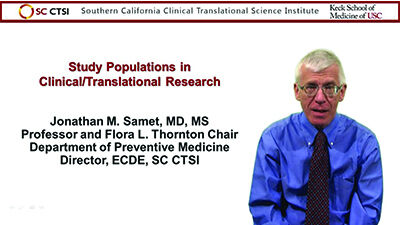In this 50-minute video lecture -- an accompaniment to the short course "Study Population and Study Design in Clinical/Translational Research, Session 2" -- a lecturer introduces fundamental terms and concepts of study design that apply to research within populations. The lecturer familiarizes clinical/translational researchers with fundamental concepts and guidelines, such as Study Populations, Target Populations, and Source populations. The lecturer also discusses the challenges unique to research in diverse "mega-cities" such as Los Angeles, including ethnic and cultural differences, how to define subpopulations meaningfully, and other factors that can bias findings and impair the overall ability to generalize research findings to broader target populations.
Researchers learn about the basic types of population studies -- Experimental and Observational (including cohort, cross-sectional, and case-control studies) -- and how to use each to study different types of interventions or exposures. Viewers learn how to identify representative source and study populations, how to develop of inclusion/exclusion criteria, about the benefits and limits of randomization, and other concepts that contribute to clinical/translational study design.

